
Starting June 1st, 2023 Our warehouse fee will be $0.65/cubic foot per month
In effort to lower the warehouse storage fee during inflation, we have went narrow aisle racking.This construction took us four months but the project is finally completed. With narrow aisle racking, we are able to drop storage by 24%.We as partners will go through this inflation together.
06/16/2024
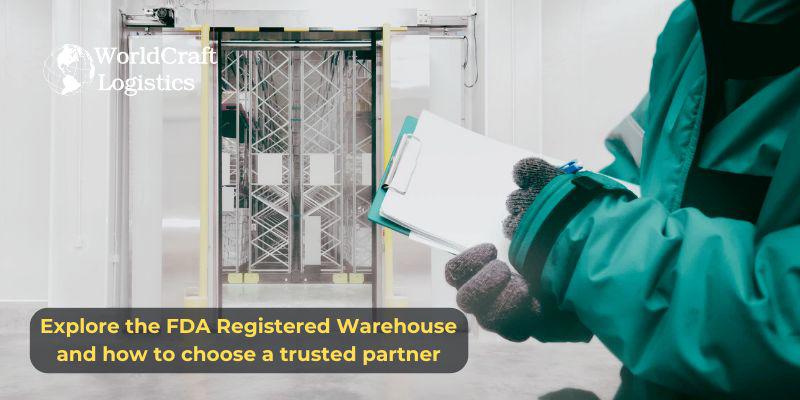
The United States Food and Drug Administration (FDA) is a governmental body tasked with ensuring the safety of various products available or produced within the country.
For brands dealing with tightly regulated items, particularly those directly marketed to consumers such as packaged foods, dietary supplements, beverages, medical goods, and cosmetics, adherence to FDA standards is crucial. Utilizing an FDA-certified warehouse becomes imperative to maintain compliance.
While the pairing of FDA registered warehouses and logistics for e-commerce brands might seem complex, understanding their significance and prerequisites is essential, especially for companies intending to distribute FDA-regulated products to consumers in the United States.
Now Worldcraft Logistics brings readers "The Ultimate Guide to FDA Registered Warehouses for E-Commerce" which serves as a comprehensive resource, covering everything needed to understand products FDA regulates as well as the utilities required for proper storage and transportation.
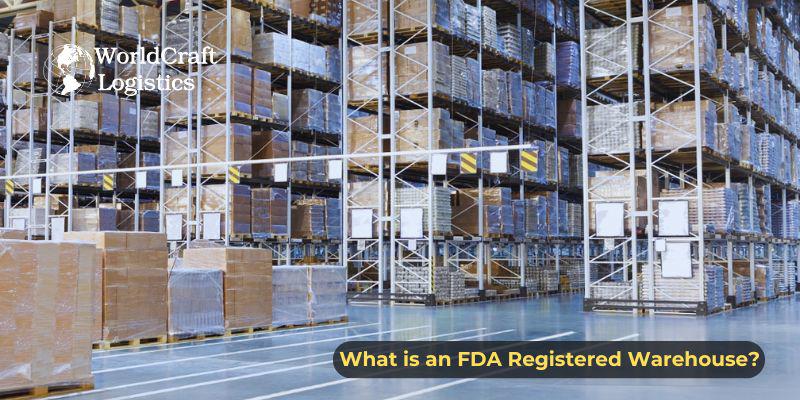
The Food and Drug Administration (FDA) plays a critical role in safeguarding public health by ensuring the safety and integrity of various products intended for human use or consumption. This includes overseeing the labeling, sanitation, and safety standards of:
Foods (excluding those regulated by the U.S. Department of Agriculture)
Human and veterinary drugs
Vaccines and other biological products
Medical devices for human use
Radiation-emitting electronic products
Cosmetics
Dietary supplements
Tobacco products
Organizations involved in the storage, repackaging, or relabeling of these regulated products must register with the FDA. Consequently, an FDA-certified warehouse refers to any storage facility or fulfillment center that has been officially registered with the FDA and authorized to handle FDA-regulated items.
Maintaining FDA fulfillment certification necessitates adherence to stringent quality standards in storage, packaging, and shipping processes. Registered organizations must consent to and successfully pass an FDA inspection every three years to validate compliance with good manufacturing practice regulations. This inspection ensures that the facility upholds the necessary standards to guarantee the safety and integrity of the products it handles.
Read more:
👉 A guide to Pick Lists: Meaning, options & Principles to remember
👉 The creative process of Crating & Packaging solutions
👉 Consolidation Warehousing: A comprehensive guide to Tips & Benefits
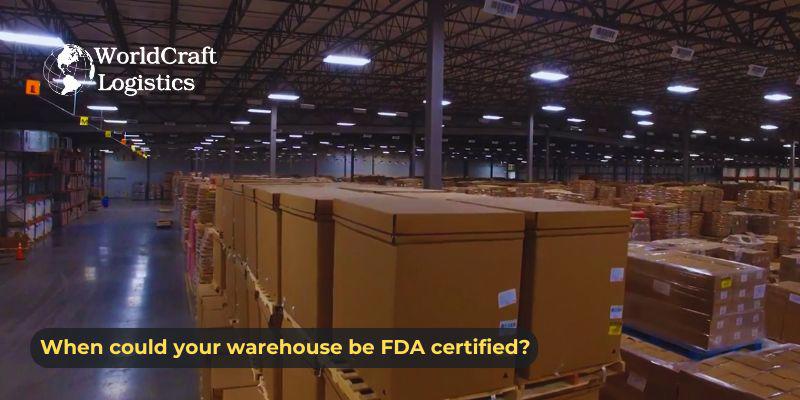
Unless an exception applies, owners and operators of food, medicine, and most device facilities - whether located domestically or abroad - must register their establishments with the FDA.
In a nutshell, it depends. The FDA has extensive regulatory jurisdiction over everything from microwaves to medications. Regretfully, the FDA also acknowledges that choosing the right regulatory body to get in touch with can be "often frustrating and confusing for consumers."
Therefore, in order to help you decide whether you need to register your warehouse with the FDA, we have provided the list of FDA offices and centers that you can get in touch with:
Center for Food Safety and Applied Nutrition (CFSAN, includes Cosmetics)
Center for Biologics Evaluation and Research (CBER)
Center for Veterinary Medicine (CVM)
Center for Drug Evaluation and Research (CDER)
Center for Devices and Radiological Health (CDRH)
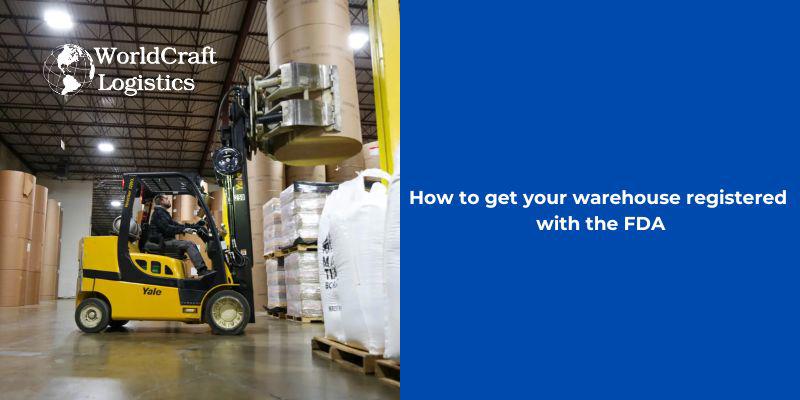
To attain FDA certification for your warehouse, the initial step is to register your facilities with the FDA. This registration process signifies your commitment to compliance with FDA regulations. Subsequently, upon registration, you agree to undergo inspections conducted by the FDA approximately every three years.
Successful completion of these inspections confirms your warehouse's adherence to FDA standards, thus establishing its approval status by the FDA. For further details and guidance on FDA registration and listing procedures, I recommend visiting the FDA Registration and Listing page for comprehensive information.
Instructions for registration Food Facility:
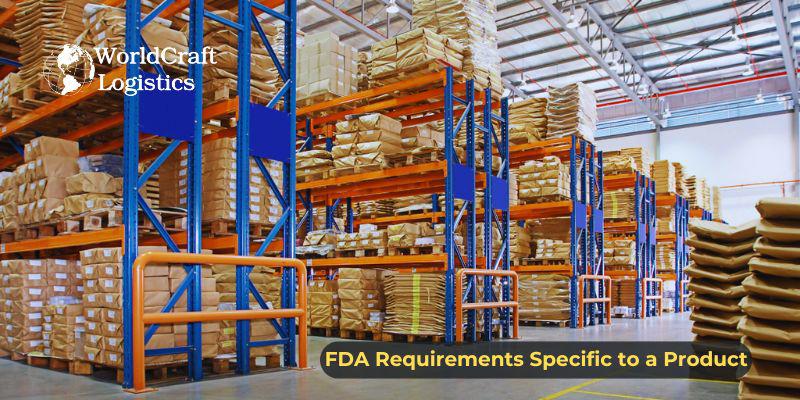
Indeed, FDA certification is crucial for a wide array of products to ensure their safety and compliance with regulatory standards. While medical devices, food and beverages, pharmaceutical products, and nutraceutical products are among the most common categories requiring FDA certification, numerous other product types fall under the FDA's regulatory jurisdiction. Here's a comprehensive list of traditionally recognized product categories subject to FDA regulation:
Packaged Foods: Including dietary supplements, bottled water, food additives, infant formulas, and various other food products.
Consumer Products: Encompassing toys, cribs, power tools, cigarette lighters, household chemicals, and other items posing fire, electrical, chemical, or mechanical hazards.
Cosmetic Products: Covering color additives present in makeup and personal care items, skin moisturizers, cleansers, nail polish, and perfumes.
Veterinary Products: Consisting of livestock feeds, pet foods, veterinary drugs, and devices.
Radiation Emitting Electronic Products: Such as microwave ovens, x-ray equipment, laser products, ultrasonic therapy equipment, mercury vapor lamps, and sunlamps.
Medical Devices: Ranging from tongue depressors and bedpans to heart pacemakers, dental devices, surgical implants, and prosthetics.
Building Supplies: Including adhesives, paints, varnish, shellac, polish, and lacquer.
Prescription and Non-prescription Drugs
Tobacco Products: Such as cigarettes, cigarette tobacco, roll-your-own tobacco, and smokeless tobacco.
This list offers a comprehensive overview of the diverse product categories subject to FDA regulation, emphasizing the agency's commitment to ensuring public health and safety across a broad spectrum of consumer goods.
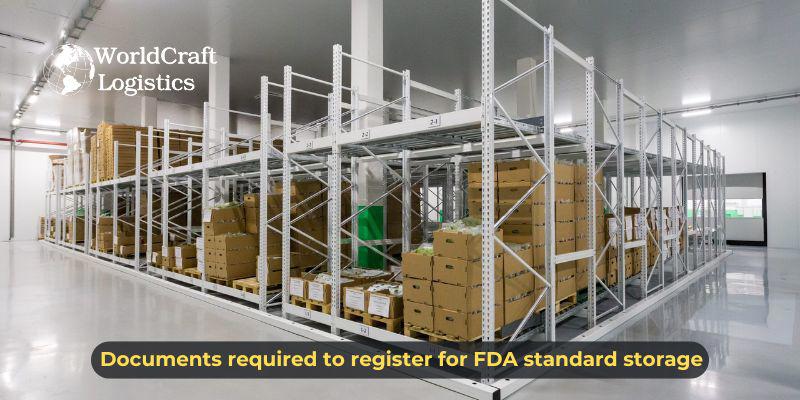
Registering for FDA standard storage involves complying with regulations that ensure the safety and efficacy of drugs, medical devices, or other FDA-regulated products. The exact documentation required can vary based on the type of product and the nature of your business. However, here is a general list of documents and information you may need to prepare:
Facility Information: Name and address of the facility. Contact information of the facility’s owner or operator. Detailed description of the facility and its operations.
Business Registration Information: Proof of business registration (e.g., state or local business licenses). Employer Identification Number (EIN).
Standard Operating Procedures (SOPs): Documentation of all standard operating procedures related to storage conditions, handling, and distribution. SOPs for temperature and humidity control, pest control, cleaning, and maintenance.
Product Information: List of all products to be stored at the facility. Copies of product labels and packaging. Material Safety Data Sheets (MSDS) for any hazardous materials.
Quality Control and Compliance Records: Quality control procedures and records. Records of compliance with Good Manufacturing Practices (GMP) or Good Distribution Practices (GDP). Any previous inspection reports or compliance notices from the FDA or other regulatory bodies.
Environmental Monitoring Records: Temperature and humidity monitoring logs. Calibration records for monitoring equipment. Records of any deviations and corrective actions taken.
Personnel Qualifications: Documentation of training and qualifications of personnel handling FDA-regulated products. Employee health and safety training records.
Security Measures: Documentation of security measures in place to prevent theft or tampering. Access control records and procedures.
Emergency Procedures: Emergency response plan for incidents such as spills, contamination, or natural disasters. Contact information for emergency services and regulatory authorities.
Insurance Documentation: Proof of liability insurance covering the storage facility and operations.
While third-party logistics providers can obtain FDA approval, it's crucial to recognize that not all FDA-registered 3PLs or fulfillment centers maintain the same standards. Without expertise in handling specific FDA-monitored products, FDA registration may not even be a priority for your fulfillment partner or 3PL.
If you seek a fulfillment partner that exceeds the basic FDA requirements, consider Worldcraft Logistics. Our expansive network comprises FDA-compliant locations dedicated to meeting the unique needs of various industries, particularly in the food and beverage sector.
Worldcraft Logistics proudly powers the premier independent Food & Beverage fulfillment network in the US. Through our partnership, we offer FDA-compliant storage and direct-to-consumer (DTC) fulfillment solutions tailored to meet the stringent requirements of top food, beverage, and other FDA-monitored companies. Trust Worldcraft Logistics to ensure the integrity and safety of your FDA-regulated products throughout the supply chain.
Here are examples of brands we've collaborated with to manage order fulfillment for their products in our FDA-registered warehouses:
Dietary Supplements: XYZ Health Supplements, Vitality Boost Nutrition, Nature's Wellness Essentials...
Packaged Food Products: Gourmet Delights Co., Fresh Eats Kitchen, Nourish Naturals Foods...
Packaged Drinks: Quench Beverages, Refresh Co., Pure Hydration Drinks...
Medical Products: First Aid Kit Survival, MedEquip Solutions, Carewell Pharmaceuticals, MediHealth Devices...
These partnerships demonstrate our commitment to providing FDA-compliant storage and fulfillment services to a diverse range of brands across various industries, ensuring the safety and integrity of their products throughout the distribution process.
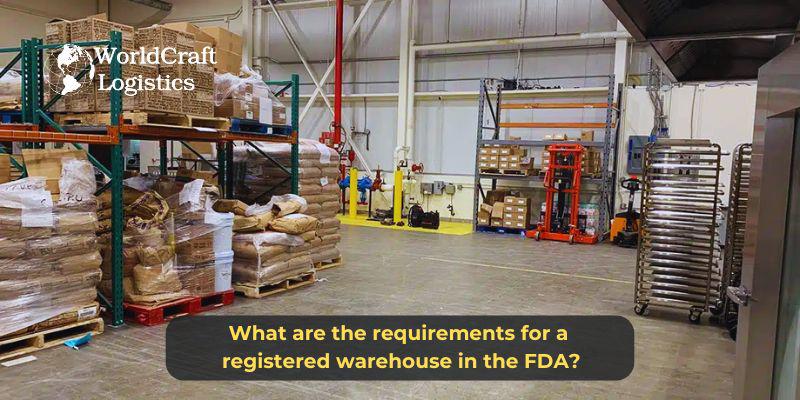
Registering a warehouse with the FDA involves ensuring compliance with several regulatory requirements to guarantee the safety and quality of stored FDA-regulated products. The requirements can vary depending on the type of products stored (e.g., food, drugs, medical devices). Below are the general requirements for a registered warehouse:
Facility Registration
Distribution Practices (GDP)
Standard Operating Procedures (SOPs)
Environmental Controls
Quality Control and Assurance
Personnel Training
Security Measures
Record Keeping
Emergency Procedures
Labeling and Traceability
By following these requirements and maintaining thorough documentation and compliance practices, a warehouse can successfully register with the FDA and ensure the safety and quality of stored FDA-regulated products.
FDA approval requirements vary depending on the type of product being submitted for approval, such as drugs, medical devices, biologics, food additives, or cosmetics. Below are the general requirements and processes for obtaining FDA approval for some of these categories:
1.1 Drugs:
Investigational New Drug (IND) Application:
Preclinical studies (lab and animal).
IND submission with study data and clinical trial plans.
Clinical Trials:
Phase 1: Safety and dosage.
Phase 2: Efficacy and side effects.
Phase 3: Confirm efficacy and monitor side effects.
New Drug Application (NDA):
Compile all data, proposed labeling, and safety updates.
FDA review and manufacturing facility inspection.
1.2 Medical Devices:
Device Classification:
Class I: Low risk.
Class II: Moderate risk.
Class III: High risk, requires Premarket Approval (PMA).
Premarket Notification (510(k)):
Show substantial equivalence to a legally marketed device.
Submit descriptive and performance data.
Premarket Approval (PMA):
Submit scientific evidence of safety and effectiveness.
Include clinical trial results and manufacturing information.
1.3 Biologics:
Investigational New Drug (IND) Application: Similar to drug IND application with preclinical studies.
Biologics License Application (BLA):
Provide clinical trial data, manufacturing processes, and labeling.
FDA review and facility inspection.
1.4 Food Additives:
Food Additive Petition:
Submit chemical composition, manufacturing process, intended use, and safety studies.
FDA review for safety assessment.
1.5 Cosmetics:
Voluntary Registration: No premarket approval, but facilities and products can be registered voluntarily.
Labeling and Safety: Ensure products are safe and properly labeled.
1.6 General Requirements:
Manufacturing Standards: Comply with Good Manufacturing Practices (GMP).
Labeling: Accurate and compliant labeling.
Post-Market Surveillance: Monitor product safety and report adverse events.
Inspections: FDA inspections to ensure regulatory compliance.
By following these guidelines, companies can navigate the FDA approval process and bring their products to market.
A GMP warehouse must ensure proper design and environmental control, maintaining appropriate temperature, humidity, and cleanliness. The facility should be constructed to prevent contamination and facilitate efficient operations, with systems in place for continuous environmental monitoring and alarms for deviations. Proper shelving, segregation of products, and a FIFO inventory system are essential, along with comprehensive SOPs and meticulous record-keeping. Regular calibration of equipment and internal audits help maintain compliance with GMP standards.
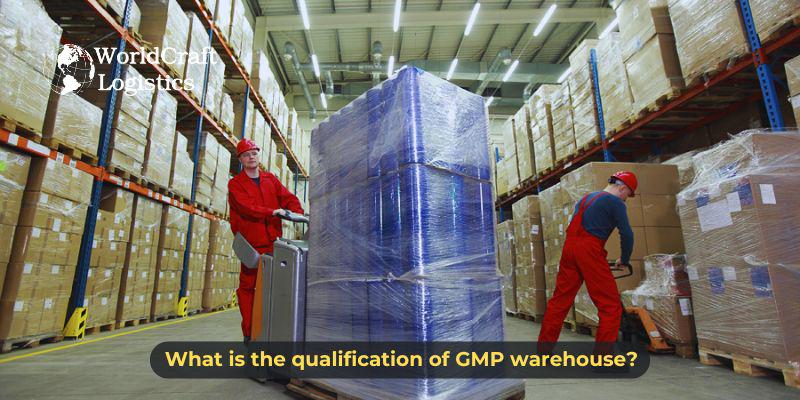
Personnel training on GMP principles, security measures, pest control, and emergency preparedness are critical for maintaining a qualified GMP warehouse. Training programs should be ongoing, and access to the warehouse should be restricted to authorized personnel only. Emergency plans and regular drills are necessary to handle potential incidents. Adhering to local and international GMP guidelines, preparing for regulatory inspections, and maintaining detailed records ensure the warehouse meets all regulatory requirements and protects the integrity of stored pharmaceutical products.
Yes, the FDA regulates facilities that manufacture, process, pack, or hold FDA-regulated products to ensure their safety, efficacy, and quality. This includes facilities involved in producing drugs, biologics, medical devices, food, beverages, and cosmetics. Facilities must comply with relevant regulations, such as Current Good Manufacturing Practices (cGMP) for drugs and biologics, Quality System Regulations (QSR) for medical devices, and Food Safety Modernization Act (FSMA) guidelines for food and beverages.
Processing, packing, storage, and distribution facilities must also adhere to FDA regulations to prevent contamination and maintain product quality. These facilities need to follow Good Storage and Distribution Practices, ensuring products are stored and transported under conditions that preserve their safety and efficacy. The FDA monitors these practices through regular inspections and requires facilities to register and provide detailed operational information.
The FDA conducts routine and issue-specific inspections to ensure compliance and may mandate corrective actions if non-compliance is found. Enforcement actions can include warning letters, product seizures, injunctions, or fines. By regulating these facilities, the FDA ensures that products on the market are safe for consumers and meet established quality standards.
FDA Registered:
Scope: Facilities and lower-risk products (e.g., Class I and II medical devices).
Process: Listing with the FDA, providing basic information.
Implication: No evaluation of safety or efficacy by the FDA.
FDA Approved:
Scope: Higher-risk products (e.g., prescription drugs, Class III medical devices).
Process: Thorough review of clinical data, safety, and efficacy.
Implication: Indicates rigorous testing and validation by the FDA.
*Key Difference: Registration means the product or facility is listed with the FDA; approval means it has passed detailed safety and efficacy evaluations.
SEO
Digital Marketing/SEO Specialist
Simon Mang is an SEO and Digital Marketing expert at Wordcraft Logistics. With many years of experience in the field of digital marketing, he has shaped and built strategies to effectively promote Wordcraft Logistics' online presence. With a deep understanding of the logistics industry, I have shared more than 500 specialized articles on many different topics.
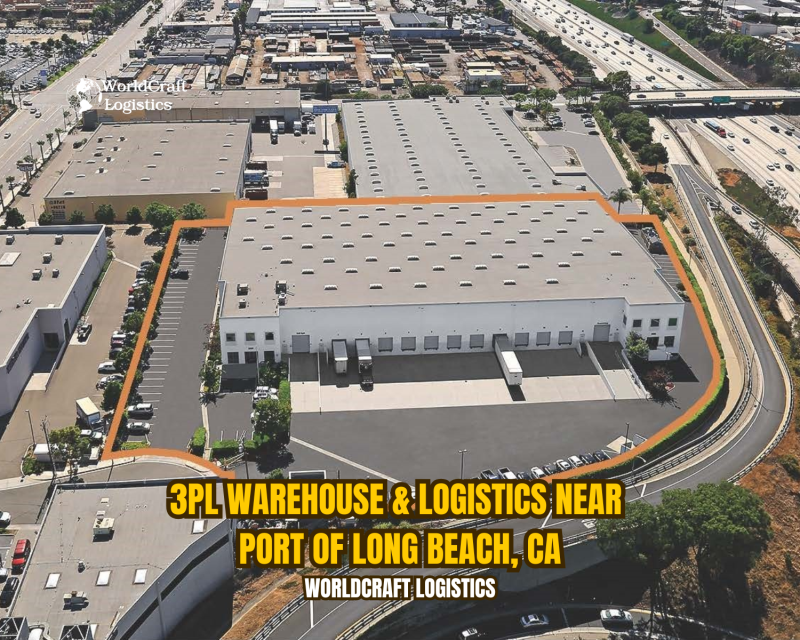
Warehouse
12/30/2024
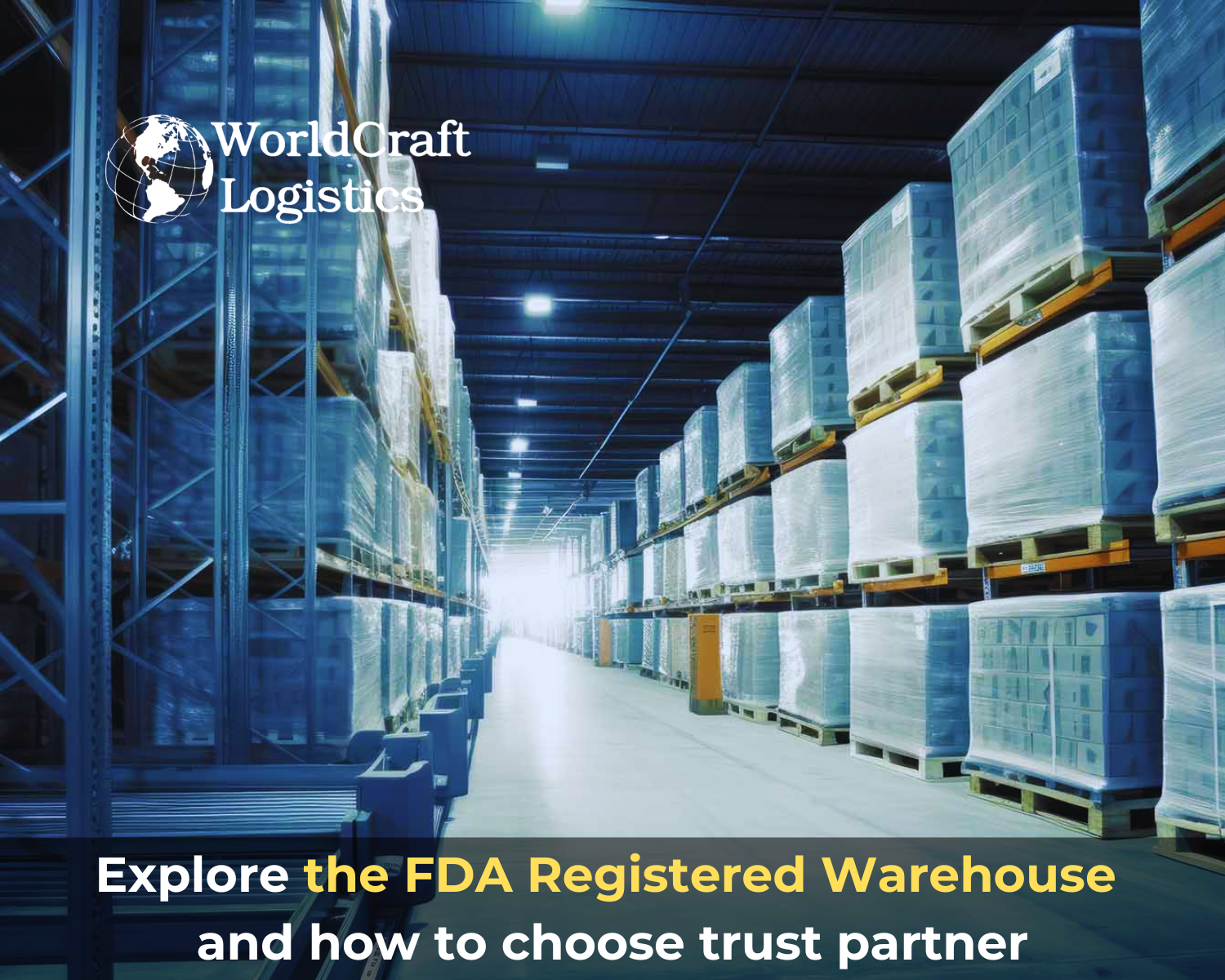
Warehouse
06/16/2024
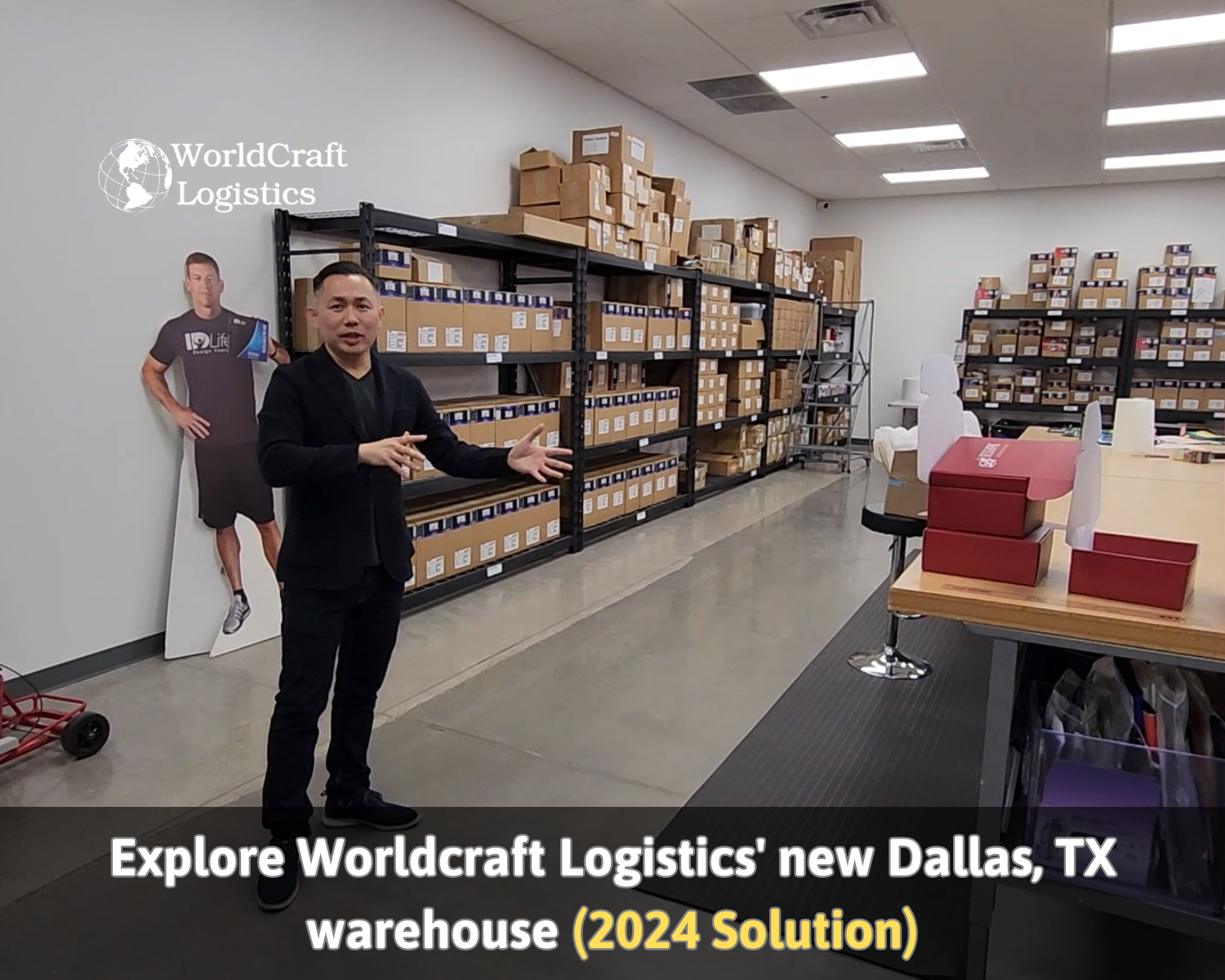
Warehouse
03/03/2024
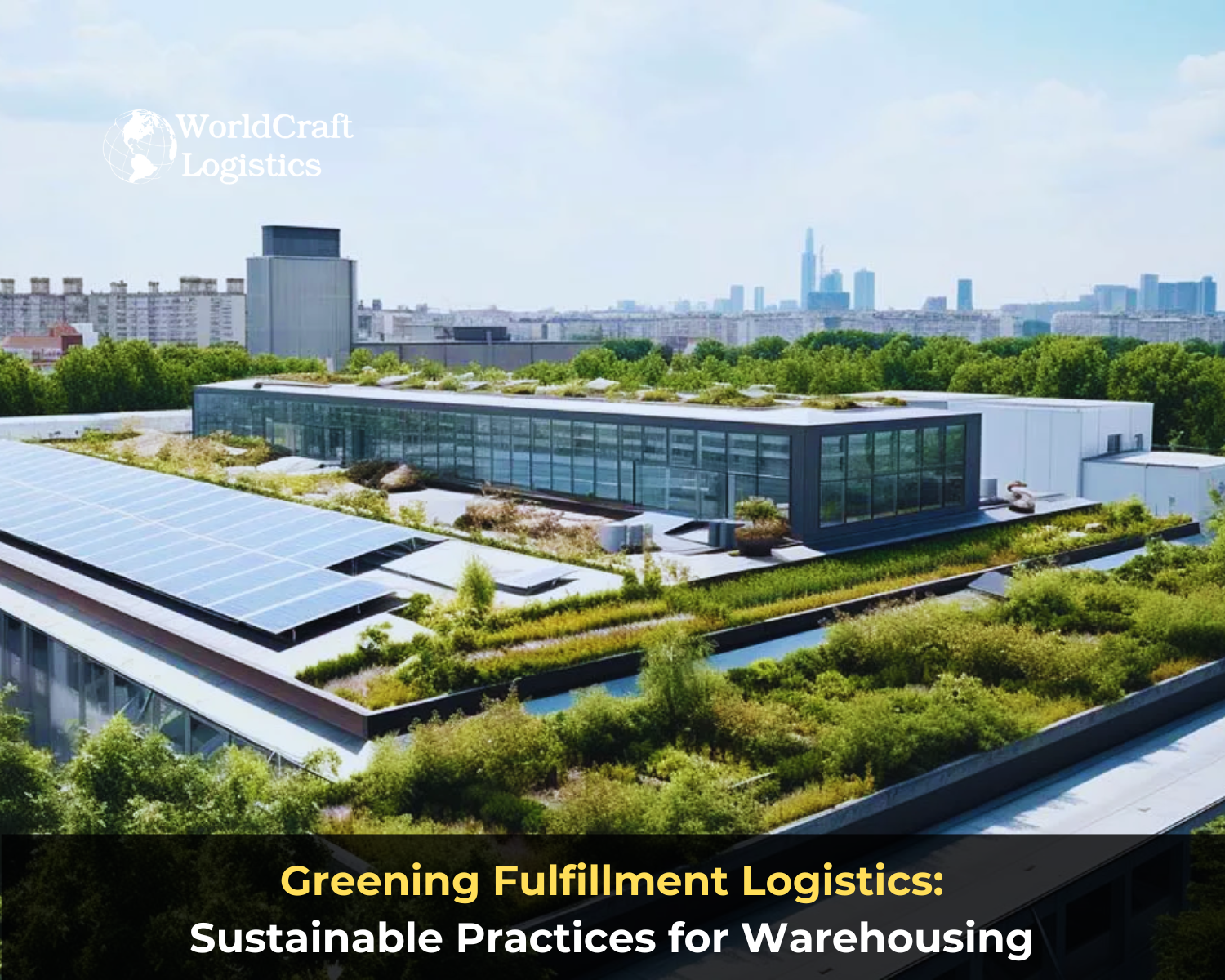
Warehouse
08/25/2024
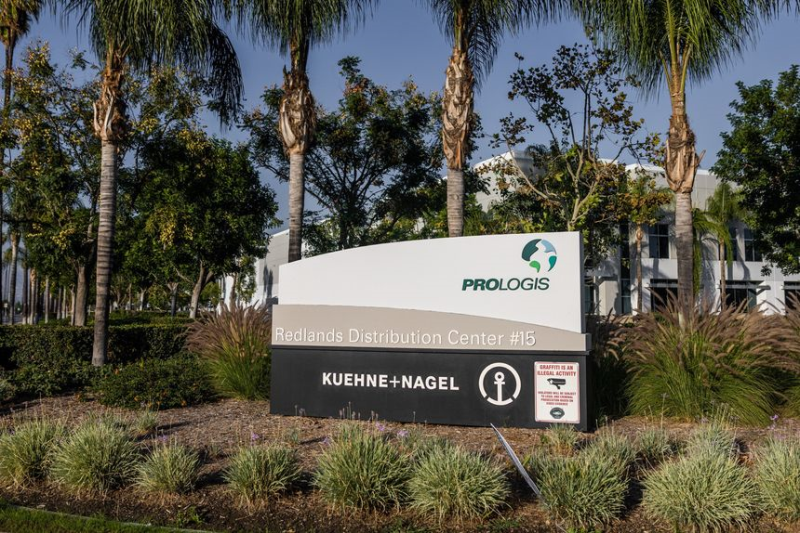
Warehouse
02/20/2023